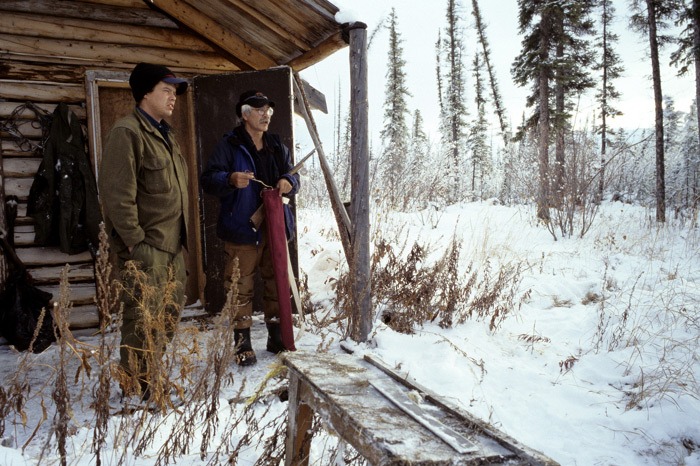
Arctic Son: Heating Up the Festival
Written by Gita Pullapilly | Posted by: Anonymous
Typically, when film producers decide on a project, they tend to pick projects close to home. But that is not the case for 34-year old Dallas Brennan Rexer, a film producer for New York-based Big Mouth Films, a division of Arts Engine, Inc. She chose the Arctic which is a three-day plane trip from New York City.
Rexer’s recent project, a 74-minute documentary called Arctic Son, is currently making its way into film festivals around the U.S. Arctic Son is a story about the relationship between a father and son in Old Crow (80 miles north of the Arctic Circle) and how they try to find commonality despite the different worlds they come from.
At the end of September, Arctic Son will be showcased at the Camden Film Festival in Maine, Rexer’s home state. Her family still resides in Monroe, Maine (near Belfast). NewEnglandFilm.com had a chance to catch up with her and talk to her about this successful documentary film project.
Gita Pullapilly: How did you become a film producer?
Dallas Brennan Rexer: It was a roundabout path. I studied philosophy in college and then worked as a researcher for about three years. I then received a Fulbright grant to Trinidad to study the burgeoning local television industry there. Afterward, I decided to jump into filmmaking and moved to New York in 1998. I began interning and apprenticing and doing anything I could think of with documentary filmmakers, waiting tables at night. I loved taking a topic I knew little about and diving into it, learning about interesting people and places and coming out with something enlightening and engaging. I joined Big Mouth Productions fairly early on in my career.
GP: What have you worked on in the past?
Rexer: I was co-producer on Outside Looking In, funded by ITVS, about trans-racial adoptions. It was a PBS project. I also worked with fellow Mainer Meema Spadola on her ITVS documentary Our House about children of gays and lesbians. I then went on to produce Journey to the West and the Emmy-nominated Deadline at Big Mouth.
GP: How did you discover the story behind Arctic Son?
Rexer: In Spring 2001, Andrew Walton, the director, told me about Old Crow, a village quite unlike any he had ever visited. Andrew asked if I would help get a film that centered on Old Crow off the ground. I was taken with the stories of the place and some of the photos that he shared. We started in 2001. Elizabeth Mandel and I both worked for a number of years to raise the funds and shape the story. Together, the three of us logged some pretty long hours.
We put together a couple of research trips. In May 2003 we discovered the "Stans" (the father and son profiled in the story) and determined that would be the focus. Then we hit the ground running and began filming over the course of three more trips the elements that would become part of the story. In the end, we had about 250 hours of footage.
GP: What was your budget for the film and how did you get funding for it?

Dallas Brennan Rexer. Photo credit: William Rexer II.
[Click to enlarge]
Rexer: I spend a lot of time in the early phases of fledgling films crafting detailed budgets, but then reality strikes and you just do what you have to do to make your film. There was a lot of begging and borrowing to just get there. We called airlines to get discounted flights, packed a lot of ramen noodles and asked cameramen to defer their rates, borrowed equipments, did our own sound (which I don’t recommend). The reality of making films is a lot different than the budget on paper. In the end the film should have been made for $300,000, but we only raised $90,000. It was a very difficult film to get funding for because it was a verite story, a personal story. Funding came in small pieces from a lot of family foundations and individual donations. Mainly from people who knew us and were willing to take a risk on our vision. LEF and the Unity Avenue Foundation were also strong supporters. And we couldn’t have done it without the institutional support of Arts Engine, Inc.
GP: Where did Arctic Son premiere?
Rexer: We had our world premiere this spring at Full Frame in North Carolina. It was a film festival I have always wanted to go to. It’s a very community-based film festival that focuses on social issues. We also brought it to Hot Docs Film Festival for its Canadian premiere and played at Munich Filmfest for its European premiere. As for the Camden Film Festival in Maine, my mother’s been asking me for copies of the finished film to give to her friends and I told her they had to wait to see it on the big screen. After five years of describing the film to family friends, I will at last be able to share it with them. It’s a terrific payoff in the end.
GP: Where will the film go after the film festivals?
Rexer: We are working with Goldcrest Films International as our sales agent. We’re talking to a number of broadcasters in the U.S. and abroad. It is a film made for the big screen since it really does quite a job of transporting you to a new place. But I’m not sure theatrical distributors know how to market it, and so much depends on marketing. We’re also having close conversations with public television and Canadian and European broadcasters.
GP: What is your next project?
Rexer: We have a film we are editing right now, which is an ITVS documentary called Election Day. It is a very different kind of film. In November 2004, we sent out 14 crews across the country and filmed a day in the life of an election day in America. We expect to finish the film in 2007 and perhaps release it next year as well. We definitely will have it out before the next presidential election.
GP: What lessons did you learn from making Arctic Son?
Rexer: It is so much easier to make a verite film in your backyard than in the Arctic. We also knew there were many moments where we could make a more sellable film if we shot or edited the film in a certain way but we chose to make the film we believed in, one that was true to our subjects and our values. We knew it was going to be a more challenging path for us, but I’m glad we stuck with it. At times, we worried that the film may not go anywhere but we just kept pushing and pushing and it paid off. The lesson learned is to keep on trying and every time you get a "no" try two more doors.
Visit the website at www.camdenfilmfest.org to learn more about Artic Son and show times. To learn more about Dallas Brennan Rexer, and the other projects of the nonprofit Arts Engine, Inc. visit: www.artsengine.net and www.mediarights.org.
Arctic Son will be playing at the Camden Film Festival September 28th-October 1st. Visit the website at www.camdenfilmfest.org to learn more about Artic Son and show times. To learn more about Dallas Brennan Rexer, and the other projects of the nonprofit Arts Engine, Inc. visit: www.artsengine.net and www.mediarights.org.










